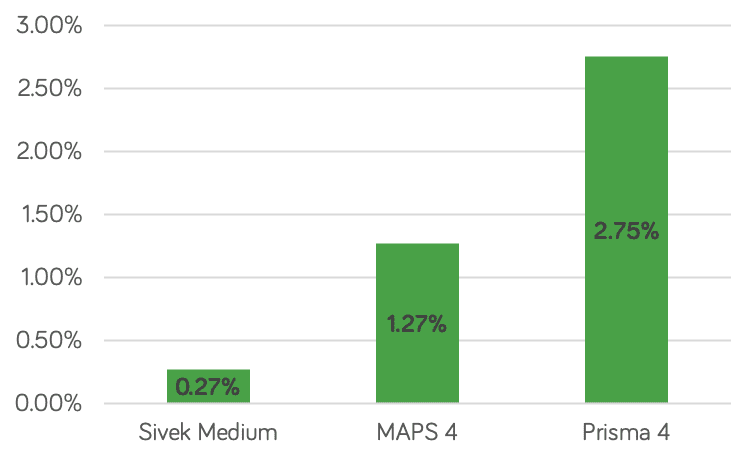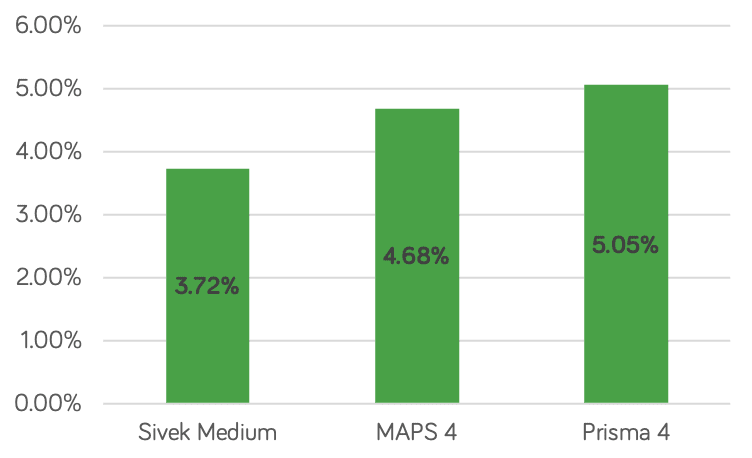Update 12 November 2021: KBC Bank is leaving Ireland. Interested in alternatives? Click the links below.
Alternatives to KBC investments
Alternatives to KBC pensions
KBC Bank has made a great effort to explain investing in Ireland, offering investments from just €125. So should you invest in KBC’s funds? We’ve reviewed their offering to help you decide.
Read on to find out more on KBC’s fund performance, costs, and some alternatives.
How do KBC’s investments work?
KBC’s offering is focused on a range of three funds, with the IKEA-sounding name of ‘Sivek’ (though they do have other options). Sivek comes in low, medium and high-risk versions. They are actively managed, multi-asset funds.
As you might expect, the higher risk fund holds more equities, and the lower risk fund holds more bonds. They can also hold commercial property and alternative investments – but don’t seem to have much of this. So far, so good.
Not online – and KBC customers only
Somewhat surprisingly for a bank that has branches in only six counties, to invest in their funds, KBC first require you to meet them in a branch. What’s more, you can only invest if you have a current account with KBC (and that comes with charges…)
Those grumbles aside, are KBC’s funds any good? We’ve analysed them in terms of performance, cost, and ease of use. We’ve focused on KBC’s “Sivek Medium” for the purposes of this article.
How has the fund performed?
Performance is relative, so it’s only fair to compare Sivek to funds which are designed with a comparable mix of investments, managed to the same volatility level, and aimed at investors with similar needs.
We’ll compare it to Irish Life’s MAPS 4 and Zurich Life’s Prisma 4. As we’ve written elsewhere, these lead the field for active multi-asset funds in Ireland. They’re a natural alternative for investors considering KBC Sivek Medium. The KBC and Zurich funds both contain 51% company shares, for example, with Irish Life’s fund a little higher at 60%.
Small print on methodology
We’ve used figures up to 30 June 2019. And we’ve reduced the MAPS and Prisma fund performance figures by 1.65% and 1.25% to take account of typical management charges (KBC’s results already include charges).
Now we’re comparing apples with apples.
First, here’s a one year view of how the three funds performed.
As you can see, Sivek has had a bad year, and you’d have made almost no money over the 12 months to the end of June. But one year is too short a period to judge any fund, and we’d never recommend investing for such a short period.
Over three years, the picture is more even, with varying performance over short term evening out over a longer term. Zurich’s Prisma fund is out in front, with average annualised growth of 4.75% after charges.
It’s a similar story over five years, with Irish Life’s MAPS fund creeping up on Prisma’s performance level of 5.05% average annualised growth.
So on performance grounds, Sivek Medium looks weak over 1, 3 and 5 years.
Maybe Sivek is better value?
How does KBC compare when it comes to investment costs? They start with an advantage, because insurance companies are required to charge a 1% government levy on all contributions to investments using a life assurance policy.
But wait for it… KBC charge a 1% “subscription fee” to investors anyway! What’s more, the life assurance companies try to compensate lump sum investors for the impact of the government levy by enhancing the allocation rate. So KBC’s 1% initial charge is a serious downside.
Then there are the ongoing charges. Sivek’s ongoing charges figure is 1.604%. That is significantly higher than the 1.25% charge you’ll encounter if you use Moneycube to invest in similar funds.
As easy as KBC?
Lastly, you might hope that KBC’s investments are simpler to deal with. In fact, they come with a serious downside from an admin perspective. Tucked away in a corner of the website, you’ll read that:
If you buy or sell an interest in a managed fund, you will be obliged to file a tax return by 31 October in the following year.
Unlike using Zurich or Irish Life, for example, if you invest using KBC (or sell your investment) you’ll need to register with Revenue and file a tax return the next year. The life assurers handle all this for you as part of the service.
Moneycube has alternatives
KBC has helped to broaden the investment landscape, particularly for first-time investors.
But on performance, cost and ease of use, there are better alternatives out there – from Zurich, Irish Life, and many others. Let us know what you want and we can help you find them.




